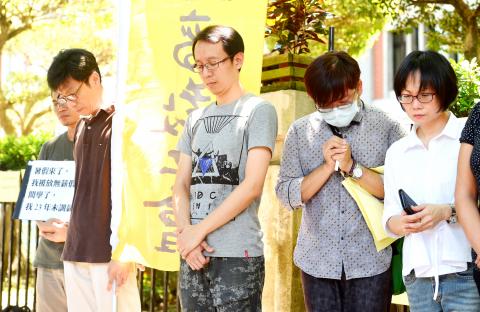Part-time lecturers working at private universities and members of the Taiwan Higher Education Union yesterday protested in front of the Ministry of Education, calling on it to promulgate rules to ensure that lecturers at private schools are paid the same hourly rates as their counterparts at public institutions.
Union director Chen Shu-han (陳書涵) said that 72 of the nation’s 110 private universities, or 67 percent, pay part-time lecturers the basic hourly rates set 23 years ago, while commodity prices have soared by 35 percent since then.
Although the Act Governing Teachers’ Salaries (教師待遇條例), which took effect this year, stipulates that teachers at public and private schools should receive the same hourly fees, many schools have ignored the law, Chen said.

Photo: Lo Pei-der, Taipei Times
Citing ministry statistics, she said that as of last year, there were more than 46,000 part-time lecturers working at private universities.
The ministry in 2014 raised hourly fees for part-time lecturers at public universities, but implemented a set of regulations saying that private institutions could set hourly rates for part-time lecturers after considering their financial conditions, Chen said.
This rule should be changed to ensure that part-time lecturers at private universities are paid the same wage for the same amount of work performed by their counterparts at public universities, she said.
Chen said the hourly pay received by full-time and part-time lecturers would be roughly equal if part-time lecturers’ hourly rates were raised by 16 percent, but many private universities have refused to do so, even though the extra spending would only constitute a small fraction of their annual revenues.
The union made a comparison between the cost of granting raises to part-time lecturers at 15 of the universities and the money the schools made in 2014.
The Oriental Institute of Technology had the widest gap, as raising the wages of its 114 part-time lecturers would have cut its NT$2.15 billion (NT$66.6 million) revenue by only 0.07 percent.
Soochow University, Chinese Culture University, Ming Chuan University, Shih Hsin University, Tamkang University and Feng Chia University were among the schools the union said did not give part-time teaching staff pay raises.
Hsu Wen-lu (徐文路), a part-time lecturer at five universities, said he earns NT$50,000 a month by teaching about 22 hours per week, but that he only gets paid nine months out of the year, during which he spends NT$14,000 for travel and rent.
The ministry said it gives importance to protecting part-time lecturers’ rights, adding that it would continue gathering opinions on the issue before drafting a solution.

Taiwanese can file complaints with the Tourism Administration to report travel agencies if their activities caused termination of a person’s citizenship, Mainland Affairs Council Minister Chiu Chui-cheng (邱垂正) said yesterday, after a podcaster highlighted a case in which a person’s citizenship was canceled for receiving a single-use Chinese passport to enter Russia. The council is aware of incidents in which people who signed up through Chinese travel agencies for tours of Russia were told they could obtain Russian visas and fast-track border clearance, Chiu told reporters on the sidelines of an event in Taipei. However, the travel agencies actually applied

Japanese footwear brand Onitsuka Tiger today issued a public apology and said it has suspended an employee amid allegations that the staff member discriminated against a Vietnamese customer at its Taipei 101 store. Posting on the social media platform Threads yesterday, a user said that an employee at the store said that “those shoes are very expensive” when her friend, who is a migrant worker from Vietnam, asked for assistance. The employee then ignored her until she asked again, to which she replied: "We don't have a size 37." The post had amassed nearly 26,000 likes and 916 comments as of this

New measures aimed at making Taiwan more attractive to foreign professionals came into effect this month, the National Development Council said yesterday. Among the changes, international students at Taiwanese universities would be able to work in Taiwan without a work permit in the two years after they graduate, explainer materials provided by the council said. In addition, foreign nationals who graduated from one of the world’s top 200 universities within the past five years can also apply for a two-year open work permit. Previously, those graduates would have needed to apply for a work permit using point-based criteria or have a Taiwanese company

The Shilin District Prosecutors’ Office yesterday indicted two Taiwanese and issued a wanted notice for Pete Liu (劉作虎), founder of Shenzhen-based smartphone manufacturer OnePlus Technology Co (萬普拉斯科技), for allegedly contravening the Act Governing Relations Between the People of the Taiwan Area and the Mainland Area (臺灣地區與大陸地區人民關係條例) by poaching 70 engineers in Taiwan. Liu allegedly traveled to Taiwan at the end of 2014 and met with a Taiwanese man surnamed Lin (林) to discuss establishing a mobile software research and development (R&D) team in Taiwan, prosecutors said. Without approval from the government, Lin, following Liu’s instructions, recruited more than 70 software